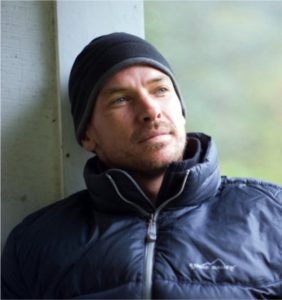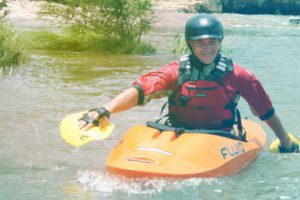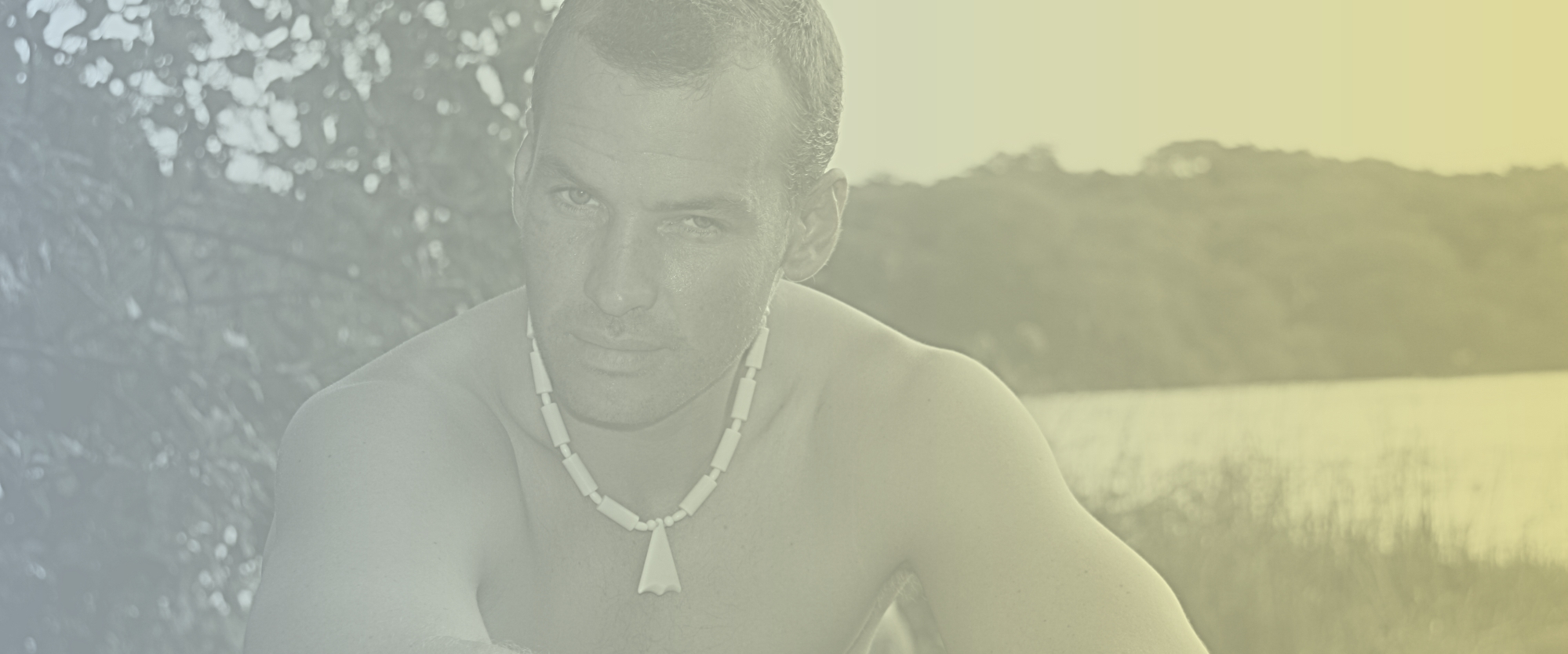Bio
THE MAN
 Already a trained South African Defense Forces medic, Coetzee qualified as a raft guide on the Zambezi in 1997. It was on the Zambezi that he started the long-term friendship with Pete Meredith. Meredith mentored Coetzee as he grew from a self-confident young paddler into an introspective explorer. The pair are most recognized for their journey along the nile in 2004, when they spent over four months journeying from the ‘source’ in Jinja, Uganda all the way to Rosetta, Egypt in the Mediterranean Sea. Between 1997 and 2004 he rafted and guided trips on rivers in eleven different countries, eight of which are in Africa.
Already a trained South African Defense Forces medic, Coetzee qualified as a raft guide on the Zambezi in 1997. It was on the Zambezi that he started the long-term friendship with Pete Meredith. Meredith mentored Coetzee as he grew from a self-confident young paddler into an introspective explorer. The pair are most recognized for their journey along the nile in 2004, when they spent over four months journeying from the ‘source’ in Jinja, Uganda all the way to Rosetta, Egypt in the Mediterranean Sea. Between 1997 and 2004 he rafted and guided trips on rivers in eleven different countries, eight of which are in Africa.
Holding a base in Jinja, Uganda, Coetzee opened up sections of river that had previously been unexplored. The ‘back channels’ as they were known, were restricted areas of whitewater, not available to the commercial rafting but perfect for the curious kayaker. The Nile progressively became Coetzee’s domain and he shared its secrets with those who were brave enough to make the trip. This includes leading trips for the likes of Scott Lindgren and Steve Fisher down the ‘Murch Section’ (2006) or inspiring the young minds of Rush Sturges and Tyler Bradt and enjoying the Jackson family during their annual pilgrimage to the warm waters of the Nile.
The golden gem of the Nile’s whitewater maintains to be the Karuma to Murchison Falls section. High on the experience of exploring unmolested Africa Coetzee reflects,
This 80 kilometer stretch of continuous class V rapids eluded the early explorers. In fact, it was not mapped until a decade after the debate was thought to be settled around the sources of the Nile, for the profound reason that local tribes had used the islands dotted along the stretch as battle grounds.
Coetzee, however was never too concerned with warring conditions. He even sought them out as prime places to explore by river. Some suppose that his comfort with conflict zones came from a time in his childhood when he lived on a military camp. His father was active in South African Defence Forces. A stoic yet adventurous man bearing the same name as his son – Johannes Hendrik Coetzee II or Henk – would have no doubt sought out the Angolan attackers that shelled his home and threatened his family. For the young Hendri, life on the frontline was terribly exciting; a place where he learned how to practice the departure and return from battle.
When rivers seemed to be conquerable and expeditions started to lose their luster, Coetzee searched for a more metaphysical connection to nature. He used solo expeditions and the meditative state they offered as a vehicle to explore his motivations. He walked along the East African Coastline from Mombassa to the Rufigi River, a distance of over one thousand kilometers. Later, in 2009 he spent six months alone in the Congolese wilderness. While in the DRC he pushed the boundaries of paddling by attempting the second descent of the Kinsuka rapids with hand paddles.
Nature, both human and wild mesmerized Coetzee. His unparalleled experiences were paired with academic and spiritual endeavors. He nurtured his thirst for knowledge through an honours degree in Psychology from the University of South Africa and a three-month meditation course in Thailand.
Coetzee’s story does not end with the last paddle strokes of December 7, 2010. He is considered a whitewater legend for pushing boundaries and encouraging others to live their dreams. This is evinced in the awards that have been named in his honour, the social media sites that continue his memory and the demand for his memoir. His ripple effect is publically expressed again and again because he derived inspiration for life from a simple philosophy:
THE BOOK
 This story is a timeless tale of a young man’s quest for wisdom, adventure, and himself. Coetzee starts his journey as a lost young man, after his parents’ divorce. This epic memoir documents his growth from a boy into a self-proclaimed Great White Explorer. Traveling as a white man on a continent that offers no camouflage, Coetzee emerges with a refreshing and truly unique African perspective.
This story is a timeless tale of a young man’s quest for wisdom, adventure, and himself. Coetzee starts his journey as a lost young man, after his parents’ divorce. This epic memoir documents his growth from a boy into a self-proclaimed Great White Explorer. Traveling as a white man on a continent that offers no camouflage, Coetzee emerges with a refreshing and truly unique African perspective.
Set as a present tense compilation of extraordinary expeditions, the reader first joins Coetzee as he leads a navigation of the Nile from source to sea. His justification for attempting a first descent of the world’s longest river through two critically unstable war zones Coetzee is,
During the four months on a raft Coetzee grapples with issues of leadership. He is continually plagued with the social intricacies of expedition travel and tries to untangle his failures within the group.
To reconcile this issue of leadership Coetzee decides that maybe traveling alone is more his style. In two subsequent chapters he becomes the only man to kayak solo in Uganda’s Murchison Falls National Park and walks for days down the Tanzanian coastline. Not clouded by the distractions of people dynamics, these chapters paint portraits of magnificent African landscapes, introspectively challenge thoughts and craft a formula for the best day ever.
The quest for the best day ever is exponentially increased during his journey in the Democratic Republic of the Congo. In the forest and on the river Coetzee claims to feel more in touch with the world around him than ever before. He kayaks monster rapids, lives on a barge, gets captured by cannibals, finds humor in bureaucracy, and experiences a sense of humanity he never expected in the infamous ‘heart of darkness’.
The final journey of this book, and indeed of Coetzee’s full life, is a kayak expedition that goes from his home in Uganda, through Rwanda, Burundi, Tanzania, and back to the Democratic Republic of the Congo. At this point he has grown into a man more concerned with political and philosophical dilemmas than trivial squabbles with teammates. Introspective curiosities in Living the Best Day Ever provide a high dose of self-deprecating humor where he constantly pokes fun at his ego and his identity as the Great White Explorer.
Filled with history and prophetic prose, this is a book that will inspire. It will make the reader laugh and, at best, it will give the outsider an unrivaled view into a modern day African explorer.





